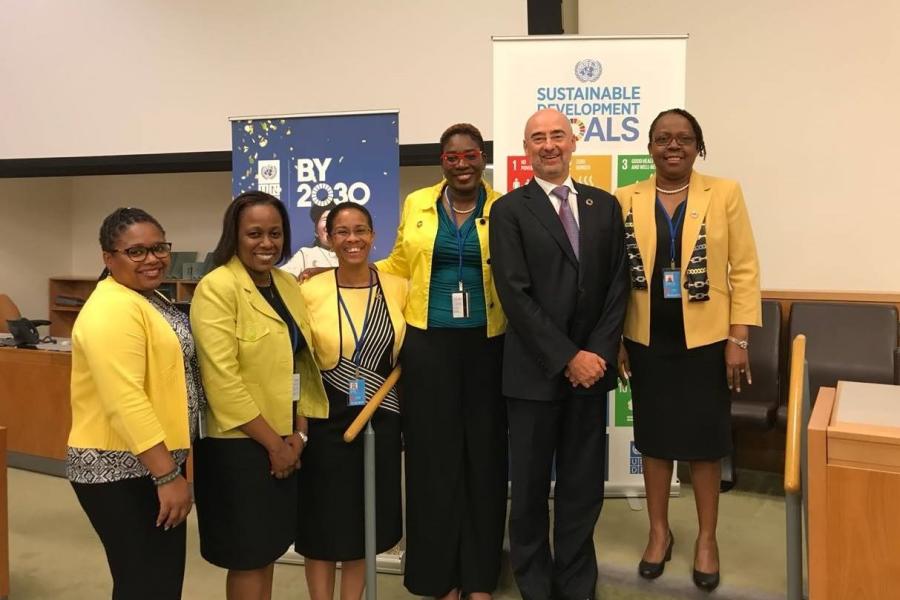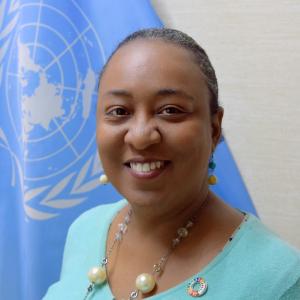Resident Coordinator Call on Governments to Integrate SDGs into Budgets
12 August 2018
- Jamaica had been seeking to mobilize institutional capital from the private sector for various priority projects.
Jamaica is being urged to effectively use its state budget to integrate the Sustainable Development Goals (SDGs) into national and local budgeting and budget reporting to ensure that all of government expenditure is understood and accounted for as contributing to the SDG.
United Nations (UN) Resident Coordinator and United Nations Development Programme (UNDP) Resident Representative, Bruno Pouezat made the proposal during the United Nations High-Level Political Forum (HLPF) in New York recently where Jamaica and a number of other countries presented their Voluntary National Review (VNR) reports of progress towards the SDGs. “The objective must be for all resources available nationally to target explicitly the national development priorities”, he stated.

Mr Pouezat said these SDG-aligned budgets and budgetary reports should also tie foreign and domestic private sector investments to the Goals where applicable. Quoting from a UN Development Coordination Office report, he noted as an example that foreign investments amounted to 5.6% of GDP in 2016, and remittances alone amounted to 17% of GDP.
He pointed out that on the other hand, with less than 0.2% of Jamaica’s Gross Domestic Product (GDP) sourced from Official Development Assistance (ODA) cannot be relied on as a reliable indicator of progress towards achievement of the SDG. ”At less than 0.2% of Jamaica’s GDP, ODA represents less than 1% of the state budget,” he noted.
Aligning budgets and budgetary reporting to the SDG was necessary to consummate a whole of government approach to the achievement of the 2030 Agenda, he concluded.
Minister of State in the Ministry of Foreign Affairs and Foreign Trade, Pearnel Charles Jnr. In his contribution to the VNR event in New York reported that 67.2% of the national outcome indicators and targets for Vision 2030 Jamaica have shown improvement over the baseline year, 2007. He said challenges remained: “As a Small Island Developing State, however, we are still faced with significant challenges, given our economic, environmental and social vulnerabilities, narrow natural resource base and limited institutional capacity. Additionally, we are frequently and adversely impacted by extreme weather events, which severely retard our development prospects.”
Minister Charles said Jamaica’s designation as an upper middle income country presents a challenge for access to certain types of aid and concessionary financing but that through engagement with the Group of Friends for SDGs Financing, Jamaica had been seeking to mobilize institutional capital from the private sector for various priority projects. “Strategic resource mobilisation is, therefore, required towards the identification of new, non-traditional and innovative financing modalities,” he observed.
Dr Wayne Henry, Director General of the Planning Institute of Jamaica noted in his VNR contribution that Jamaica had moved to prioritize transformative actions outlined in a Roadmap for implementation of the SDGs in Jamaica with the support of the UNDP. He outlined these accelerators include social protection outreach to those furthest behind; multidisciplinary efforts to tackle the drivers of Non-Communicable Diseases (NCDs); strengthening the effectiveness of the judicial system; violence prevention programmes; building disaster risk resilience; and advancing the development of the blue and green economies.
Dr Henry said Jamaica was deliberately integrating climate hazards across all dimensions of sustainable development planning because of repeated impacts including dislocation of population, disruption of livelihoods, and damage and losses, which have historically been equivalent to 1-2% of GDP per annum.
And in reporting on the need for high quality data to guide development priorities in the SDGs, Deputy Director of the Statistical Institute of Jamaica (STATIN), Leesha Delatie-Budair said that while the National Statistics System was able to produce 49% of SDG indicators, “a lot more (needs) to be done to improve official statistics in Jamaica.”
The HLPF is the main United Nations platform on sustainable development and it has a central role in the follow-up and review of the 2030 Agenda for Sustainable Development the Sustainable Development Goals (SDGs) at the global level.



















